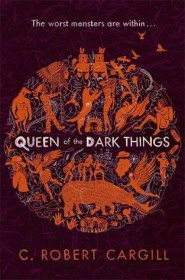GUEST BLOG Screenwriting Vs Novels
C Robert Cargill reveals the different skills an author needs to write for the page and the screen.
This is a guest blog by C Robert Cargill , author of Dreams And Shadows and Queen Of The Dark Things ...

When I was a kid, there were three things I wanted to be when I grew up: a film critic, a novelist or a screenwriter. I knew I wanted to be a writer, but I was never sure exactly what kind. I've been blessed in that I've been afforded the chance to do all three professionally. Though I left film critique behind after ten years on the job, I find myself at present employed full time doing the other two, so it should come as little surprise that the questions I get most often are which I prefer and what the challenges of each are. And yet, each time it's asked I have to pause, think hard about it, and try to find out if I've figured out the answer to the first one. Because the second question only seems to give me all the reasons why I can't ever choose.
Each of these jobs is wholly different from the other. While they all take place with me hovering over the very same keyboard, sipping coffee from the very same giant mug, and pacing around my driveway at three in the morning tracing the very same steps, each of them offers different advantages while at the same time being limiting in their own ways. And at the moment that I'm working on one project and it has me pulling my hair out swearing I'm never going to write this kind of project again, I know that one of the other jobs is waiting for me on the other side. But the moment I shift mediums, I'm reminded of all the reasons I love the one I swore off days before.
The greatest part about writing movies is that the reach of your film exceeds that of most books. Even a modest hit like my movie Sinister can and will be seen by tens of millions of people over its life. And with the ever expanding reach of the internet, those numbers only begin to swell. But while they say that most writing is rewriting, this is never truer than in screenwriting. The art of screenwriting is one in which you try to tell the deepest story you can, using as few words as possible. "Never use seven words when five will do." Despite a screenplay comprising only about a tenth of the number of words you'll find in a novel, you no doubt end up rewriting those words and scenes so often that it takes sometimes just as long as a novel does. To make matters worse, you are married to a structure not dictated by the industry, but by what the audience expects. Stray too far, bore the audience for even a minute, and you can lose them for good. But a single short scene in a movie can be just as powerful as an entire chapter in a book, saying everything with a few wistful looks that you might spend paragraphs trying to get right in print.
The greatest part about novels is how forgiving and patient the audience is. They want to stop and smell the roses every once in a while. They want to dig deep into your character's backstory, to know why the towers in your world were constructed the way they were. Most importantly, they are more than willing to let you play around with the structure. You can write a novel about a despicable character that does things you could never allow a protagonist in a movie to do; you can write it in first person with five different protagonists; you can end on a dour note that leaves the audience reeling without needing a punchy outro to remind them of all the fun they had prior to that moment.

But there are no $25 million dollar ad campaigns telling people about your book and there are only about 600 Hollywood produced movies a year versus 300,000 books (in the United States alone.) A person could watch two movies a day and see them all, but even the fastest readers would have to struggle to read as many books, never reading one half of 1 percent of those released in a given year. You often have to fight for every reader you get. And that means making choices not unlike those you have to make when coming up with ideas for movies.
Weekly digests, tales from the communities you love, and more
No one ever asks you what the "trailer moments" are in your book and you never have to have that book critiqued by a committee of attached producers and executives, some of whom want to add their own ideas into the mix. And screenwriting is the only job in Hollywood in which you can work on a movie for months but end up without your name anywhere on it. A finished book is a finished work and there are ways to share it with the world, good or not, but great scripts sit languishing in stacks waiting for the financing or talent to come together to make it, many of them never seeing the light of day despite being bought, paid for and the darling of big name talent or producers.
And yet despite all of that, the only thing that comes close to the joy of watching an audience's eyes light up as they watch your finished movie is that of sitting in a bookstore when a reader comes up with a battered, dog-eared copy of your book to tell you exactly what it meant to them. There is a certain pleasure in writing 2500 words of a novel in a single sitting - that you know will go mostly unmolested - that is matched only by that of witling a two page scene in a screenplay down into five lines of dialog that just pop on the page.
I don't think I ever want to stop doing either. So which one do I love the most? Whichever I'm doing next, I suppose; whichever the idea I'm in love with at the moment belongs to most and will be its best. I don't know if I want people to remember best as a novelist or a screenwriter. Right now I'm thrilled that I get to be both.
The sequel to Dreams And Shadows is Queen Of The Dark Things and it's out now; you can read more about them and C Robert Cargill at his blog or on the site of his publisher Gollancz .
SFX Magazine is the world's number one sci-fi, fantasy, and horror magazine published by Future PLC. Established in 1995, SFX Magazine prides itself on writing for its fans, welcoming geeks, collectors, and aficionados into its readership for over 25 years. Covering films, TV shows, books, comics, games, merch, and more, SFX Magazine is published every month. If you love it, chances are we do too and you'll find it in SFX.


